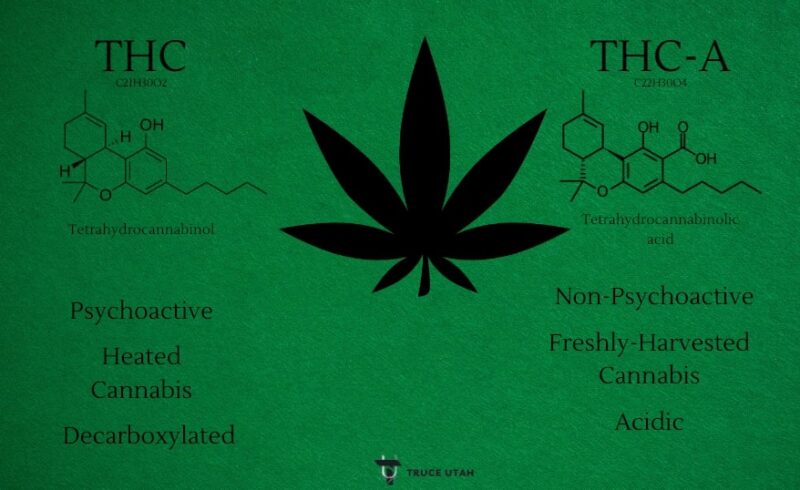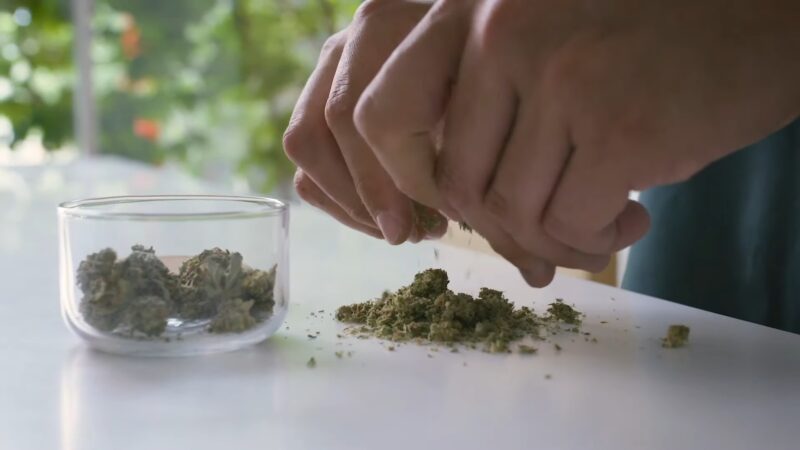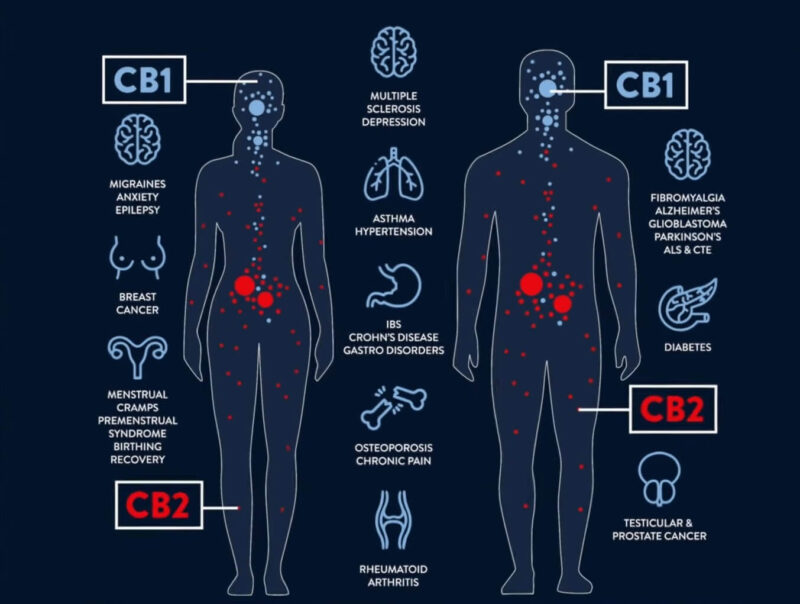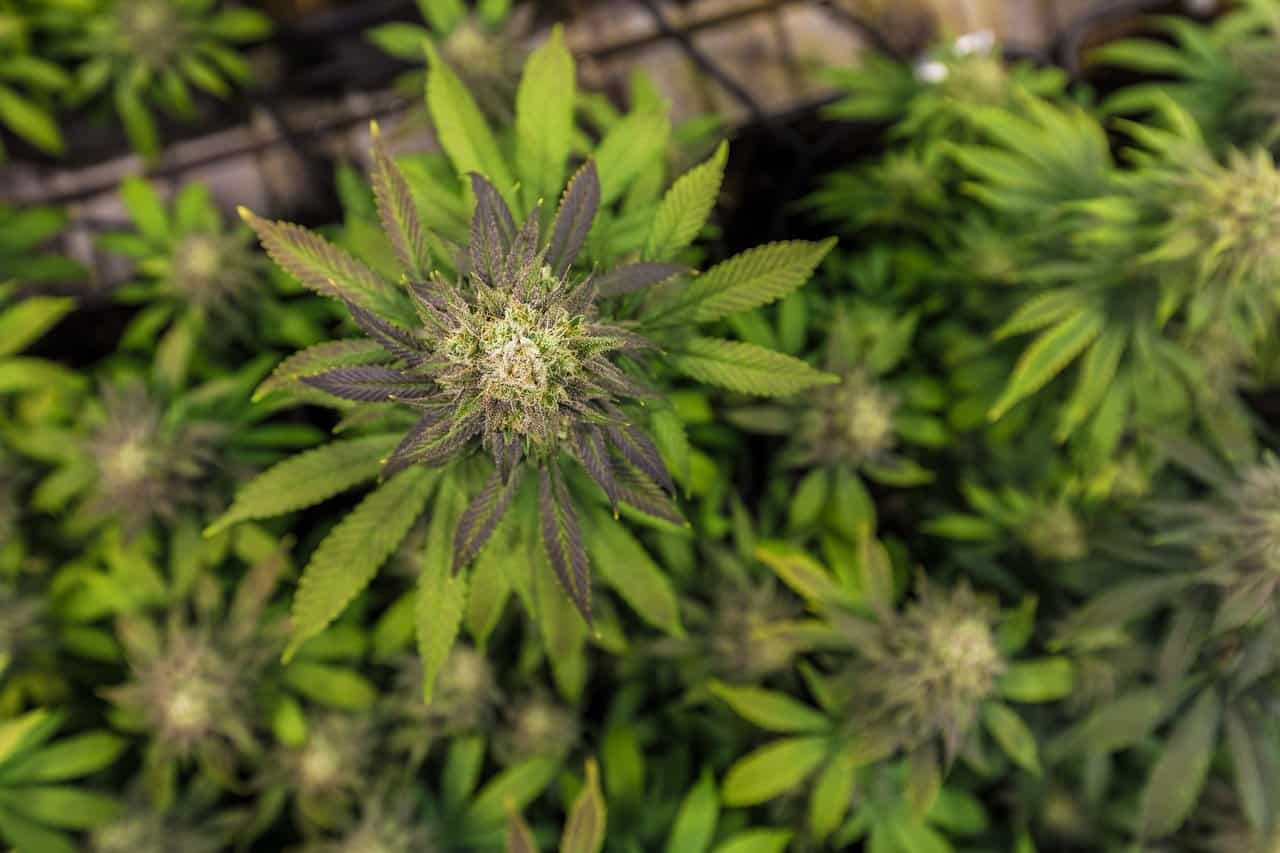Let’s talk about two heavy hitters in the cannabis world: THCA and THC. What’s the deal with these two? Why does one make you feel all relaxed and happy, while the other… well, doesn’t?
The short answer is that THC is stronger, but there is much more to it. Grab a seat, maybe a snack, and let’s get into it.
The Basics

THCA
THCA, or Tetrahydrocannabinolic acid, is like THC’s less exciting older sibling. It’s found in live, freshly-harvested cannabis and is non-psychoactive.
Yep, no high here. It’s the compound in raw cannabis that doesn’t get you buzzed but has some interesting therapeutic potential.
THC
THC, or Tetrahydrocannabinol, is the rock star. It’s the compound that brings the euphoric, mind-altering effects we associate with cannabis.
When people talk about getting high, they’re talking about THC. It’s what makes marijuana, well, marijuana.
The Decarboxylation Process

Turning THCA into THC
Here’s where things get heated, literally. THCA converts to THC through a process called decarboxylation.
When you apply heat (think smoking, vaping, or baking), THCA loses a carboxyl group and transforms into THC. This chemical reaction is why raw cannabis doesn’t get you high, but a joint will.
Why It Matters
Without decarboxylation, your cannabis is just a leafy salad. It’s the heat that activates the psychoactive properties of THC, turning your calm, collected THCA into the life of the party.
Which Packs a Bigger Punch In Terms of Potency?

THC’s Psychoactive Power
When it comes to potency, THC wins. It’s psychoactive, creating noticeable effects like euphoria, relaxation, and sometimes even anxiety if you overdo it. It’s the reason people use cannabis for both recreational and medicinal purposes.
THCA’s Subtle Strength
THCA doesn’t give you a high, but it’s not entirely without merit. It’s being researched for its potential anti-inflammatory and neuroprotective properties. It might not make you feel like you’re floating, but it could help keep your body in check.
THC’s Therapeutic Uses
THC has a laundry list of potential benefits:
- Reducing anxiety (in low doses)
- Acting as an analgesic (pain relief)
- Alleviating nausea
- Increasing appetite
THCA’s Health Perks
THCA is still being studied, but early research suggests it could help with:
- Anti-inflammatory effects
- Neuroprotection
- Anti-nausea benefits
- Possible contributions to reducing obesity and related health issues
Side Effects
THC’s Downside
THC isn’t all rainbows and butterflies. It can cause:
- Anxiety
- Dry mouth
- Memory loss
THCA’s Side Effects
THCA’s side effects are less known, but some users report drowsiness or, conversely, increased energy. It’s a mixed bag and more research is needed.
Legal Status Is A Mixed Bag
Under US federal law, THC is illegal in many states, except for hemp-derived cannabinoids containing less than 0.3% THC. One such state is Utah. So, while you might be able to buy THC products in Colorado, don’t try the same in Idaho.
The legality of THCA is murkier. Since it doesn’t get you high, it’s not always specifically regulated, but it can still show up on drug tests, complicating things further.
Drug Tests
Both THCA and THC can be detected in drug tests. THCA is sometimes used as a marker to detect THC use, so don’t think munching on raw cannabis will help you pass that test.
Consumption Methods
THCA Products
THCA is available in various forms:
- Oils
- Capsules
- Edibles
THC’s Versatility
Once decarboxylated, THC can be consumed in countless ways:
- Smoking
- Vaping
- Edibles
- Tinctures
The Endocannabinoid System (ECS)

How They Interact
Both THCA and THC interact with the body’s ECS, which helps regulate functions like sleep and mood. THC binds strongly to CB1 receptors, affecting mental processes, while THCA’s interaction is weaker and less understood.
The Chemical Difference
Chemically, THCA has an additional carboxyl group, making it a precursor to THC. This difference means THCA doesn’t effectively bind to CB1 or CB2 receptors, so it doesn’t produce intoxicating effects.
Getting the Numbers Right
Accurate measurement of final THC content in a product involves converting THCA percentage to milligrams, adjusting for decarboxylation efficiency, and adding any existing THC content.
The cannabis industry uses different methods (like liquid chromatography and gas chromatography) for potency testing, which can yield different results.
So, Which Is Stronger?
In the battle of THCA vs THC, THC clearly takes the crown for potency and psychoactive effects. THCA might not give you that high, but it holds its own in the therapeutic benefits department.
Both have their place in the cannabis world, and the choice between them depends on what you’re looking for. Whether it’s a buzz or some potential health benefits, there’s something for everyone.

